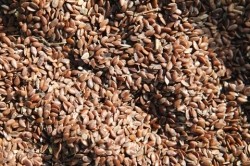Flaxseed supplementation may aid metabolic syndrome management, study finds

Globally, metabolic disorders such as type 2 diabetes and cardiovascular disease have become a major issue, which researchers link to high-energy intake paired with a sedentary lifestyle.
Researchers from the Tehran University of Medical Sciences noted that in existing studies, flaxseeds have potential in reducing risk of cardiovascular disease, diabetes, and hypertension. “However, there are scarce published literatures that have shown the effects of whole grain flaxseed on some components of Metabolic Syndrome in experimental and human studies,” they wrote.
In a pilot randomized, open-labeled, controlled study, the researchers found that “co-administration of flaxseed with lifestyle modification is more effective than lifestyle modification alone in management of metabolic syndrome.”
Flaxseed is a supplement favorite because of its high amounts of alpha-linolenic acid, as well as soluble fiber and lignin precursors.
Study design
There were 44 participants recruited between the ages of 18 to 70, both male and female. They were then randomly divided into two groups of 22 participants each. One group was told to consume 30 g/day of brown milled flaxseed supplementation (purchased from a farm in the West Azerbaijan province of Iran), and to eat it with salad at lunch or dinner.
Though only one group was told to consume flaxseed, both groups were to follow a 12-week controlled and guided lifestyle, which was presented to them in a 20-min talk, together with guidance for record keeping. This involved approximately 30 minutes of moderate intensity physical activity five times a week.
At the first week, anthropometric measurements were noted, and clinic visits were conducted on weeks 4, 8, and 12.
Findings
Through blood sample analysis and body measurements, the researchers found that “the percentage of all participants with metabolic syndrome was 34% after intervention, which was significantly lower than that at the baseline.”
When broken down by group, individuals with metabolic syndrome in the flaxseed group decreased by 82%, while the non-flaxseed group’s decrease was 50%.
“Moreover, body weight, body mass index, and insulin resistance reduced, while insulin sensitivity increased in both groups,” the report said. “However these changes were significantly greater in flaxseed group rather than control group.”
Researchers pointed out that their findings for flaxseed’s insulin reduction benefits through deceleration of glucose absorption, which is due to high content of fiber and lignin, agrees with previous studies.
“One limitation of our study was the open-label design,” the researchers wrote. “An inert placebo for flaxseed was not known.”
Source: Phytotherapy Research
Published online ahead of print, doi: 10.1002/ptr.5635.
Flaxseed Supplementation in Metabolic Syndrome Management: A Pilot Randomized, Open-labeled, Controlled Study
Authors: Yari Z., et al.












